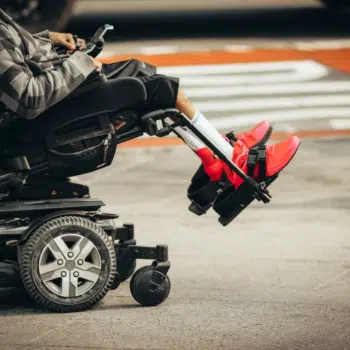Disabilities and the Church
by Jean Kingery
In the United States, about 1 in 6 people have some type of disability. But in church that proportion isn’t usually represented. A Clemson University study in 2018 found that there are 2.5 million Christians with disabilities in the United States who want to go to church… but don’t. And if these 2.5 million people have parents, siblings, and spouses, that number gets much higher. And that’s to say nothing of people with disabilities who aren’t yet believers.
So why is there this gap between people with disabilities and the church? Nobody wants to exclude people with disabilities… and yet, we see that by and large people with disabilities are underrepresented in our churches.
The short answer is that the world is already filled with barriers. We don’t need to do anything to put them there. What we do need to do is find those barriers and ask the question, “What can we do about them?”
There are many misconceptions about disability. Phrases like “special needs” confuse the issue even further. Because the truth of the matter is that people with disabilities have the same needs as “everyone else” including friendship, community, and crucially—the gospel.

Do we want to live out our mission at VINIA to engage, develop and empower leaders for kingdom movement? If so… that mission must include people with disabilities. First Corinthians 12 describes the church as the body of Christ and significantly demonstrates unity in diversity and mutual dependence. Verses 21 and 22 say, “The eye cannot say to the hand, ‘I have no need of you,’ nor again the head to the feet, ‘I have no need of you.’ On the contrary, the parts of the body that seem to be weaker are indispensable.”
Friends, it’s not just people with disabilities who need the church. It’s the church who needs people with disabilities. When we allow barriers to persist that keep families affected by disability from the church, is it possible that we are keeping parts of our God-ordained body disconnected?
This isn’t about pitying people with disabilities. It’s about building up the body of Christ, loving those God loves, and fulfilling the Great Commission.
Founder of Joni and Friends, Joni Erickson Tada, reminds us that disability ministry is not ministry unless those with disabilities are ministering! Remember, it’s not just people with disabilities who need the church. It’s the church who needs people with disabilities.
Ephesians 4:4-6 says, “There is one body and one Spirit—just as you were called to the one hope that belongs to your call—one Lord, one faith, one baptism, one God and Father of all, who is over all and through all and in all.”
If God has called every person, regardless of physical or intellectual ability, into relationship with Him… shouldn’t we at VINIA make the same invitation? And since the world is filled with barriers, passive acceptance isn’t enough. We need to be intentional about seeking out and removing barriers that keep people from church and keep them from participating once they get there.
Hopefully, by now, you are asking the question, “So what can we do as a church to further this goal?”
- Listen to the experiences of people with disabilities. Find out their story.
- Ask them to share the “barriers” that they encounter.
- Pray that God would open our eyes to ways we can make our community a place of gospel-centered inclusivity.
Jean Kingery has served on staff with Global Training Network for over a decade, is a credentialed minister with Vinia, and serves on the leadership team at Cornerstone Church, focusing on families affected by disability. The goal of her recent book The Crimson Thread Through Disability: Discover God’s Heart and Your Part is to globally train pastors and church leaders to embrace disability ministry… multiplying the Luke 14 model.
This blog post is from the November 8, 2022 Vinia Newsletter.
If you would like to sign up to receive the Vinia Newsletter, you can do so here.

